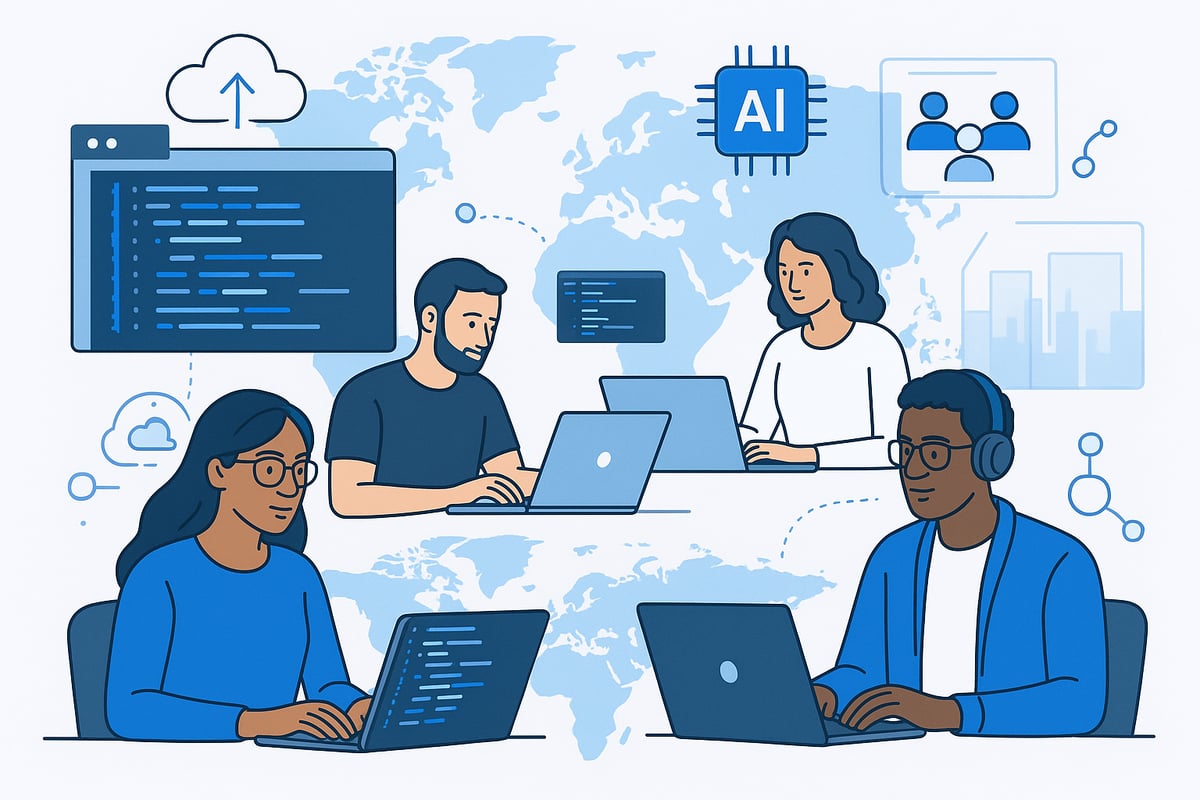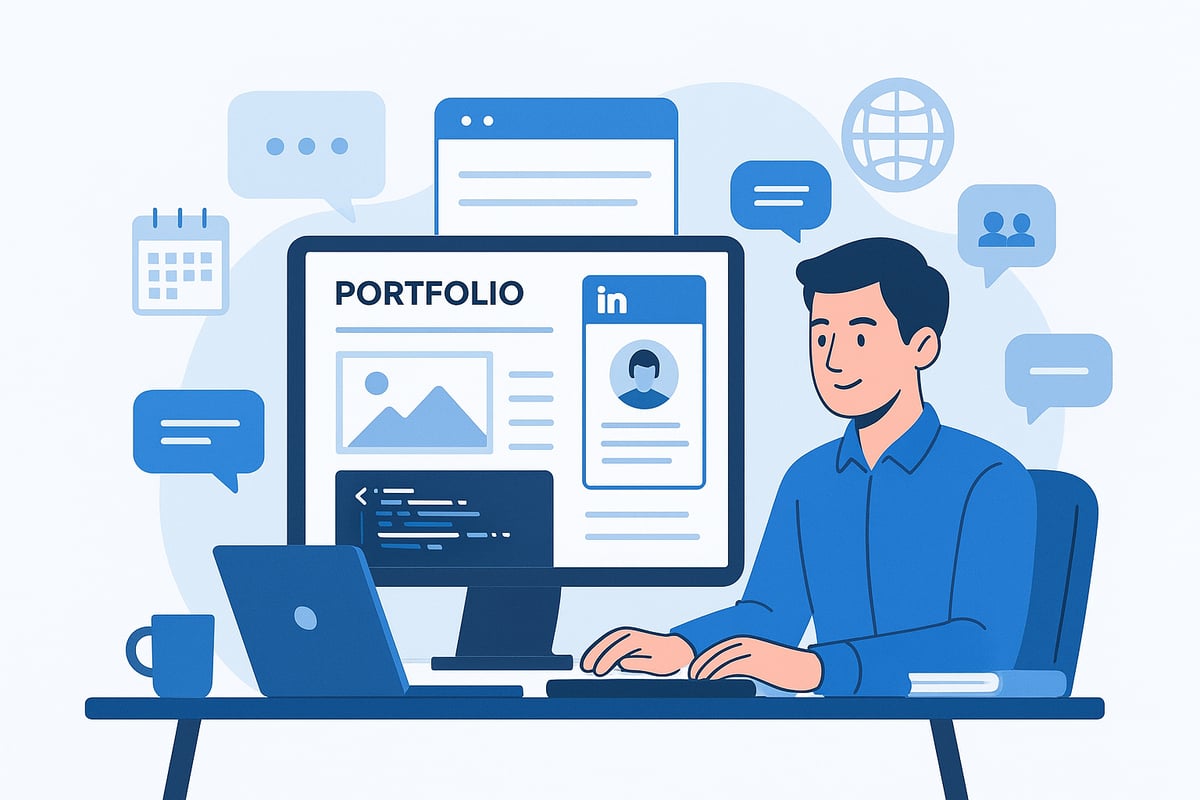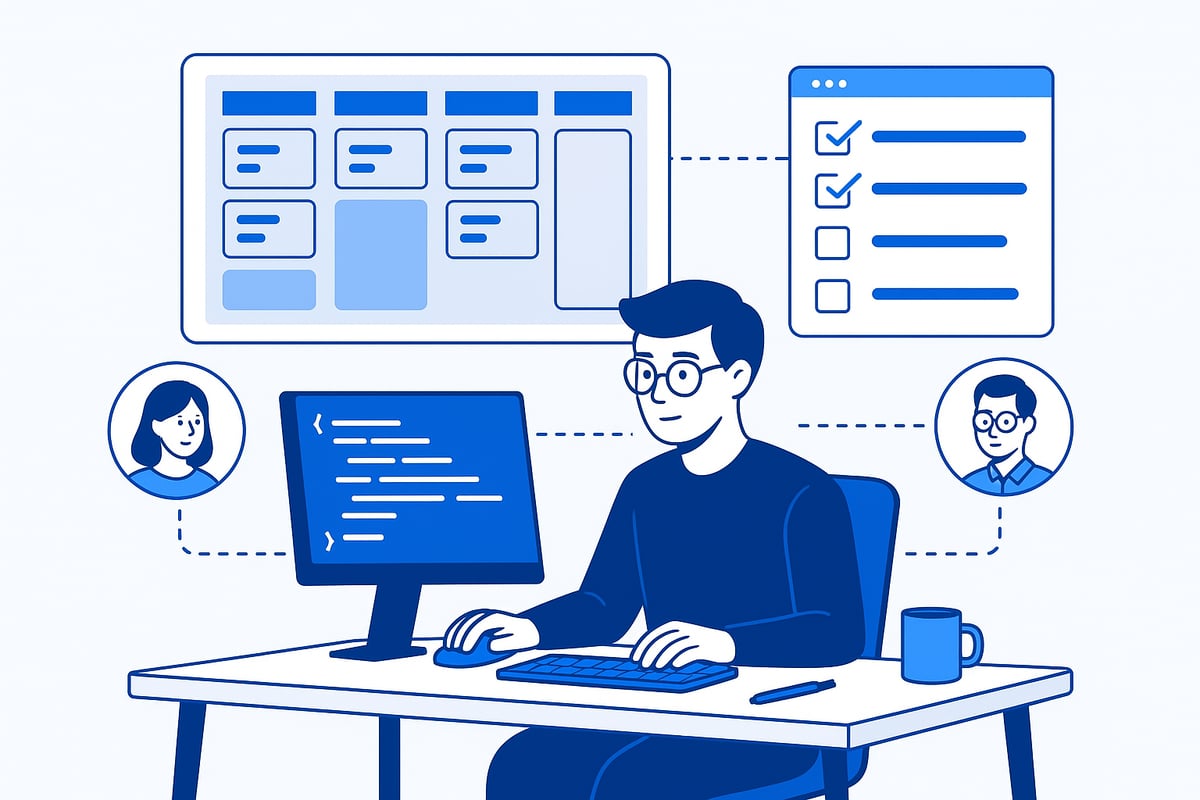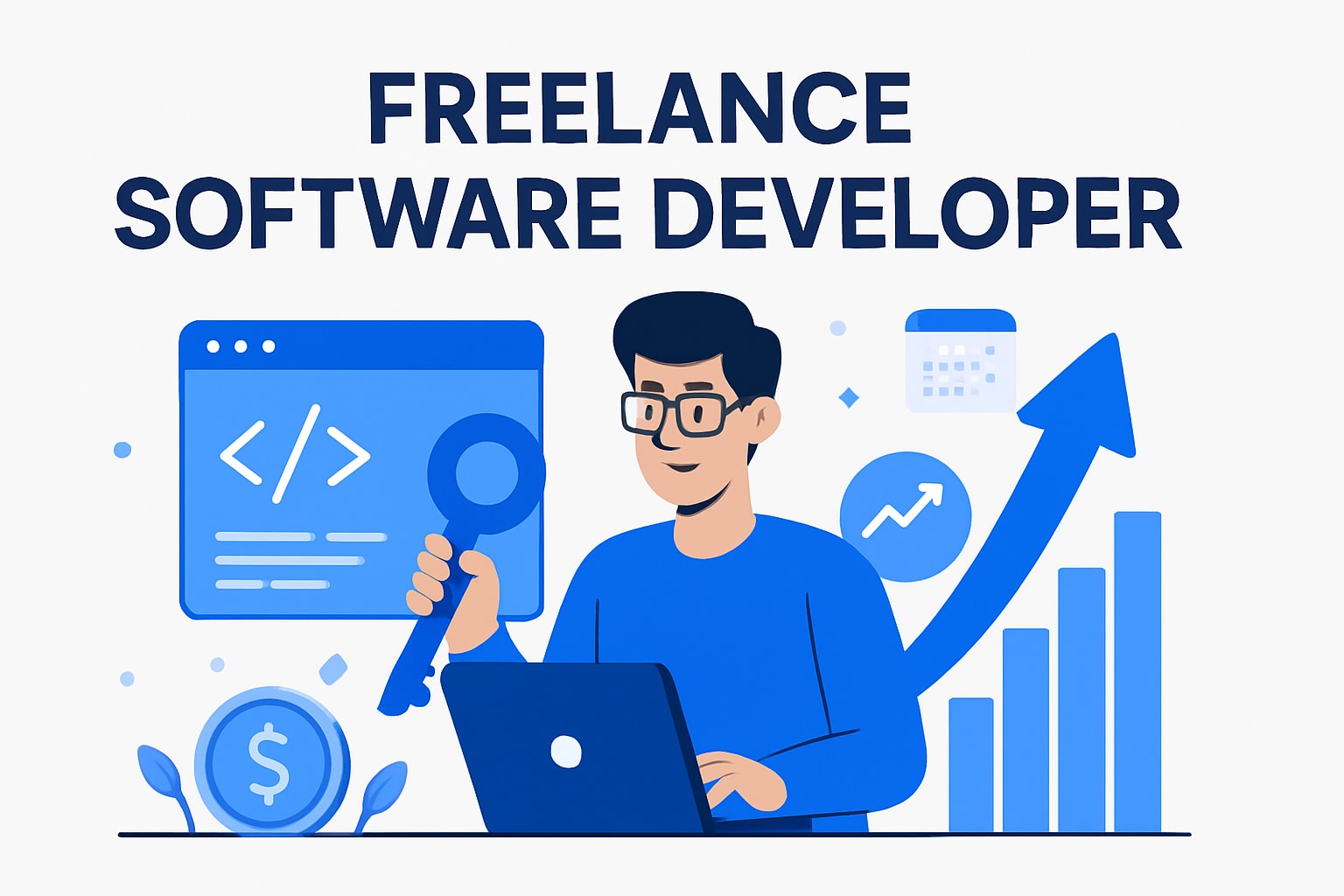Imagine a career where you choose your projects, set your schedule, and unlock limitless income—welcome to the world of the freelance software developer in 2025.
This guide gives you the latest strategies and actionable tips to help any freelance software developer thrive in a rapidly changing digital landscape.
You will discover the essential skills you need, the hottest market trends, proven ways to find clients, smart pricing, project management hacks, and how to future-proof your career.
Remote and freelance work is booming, and the demand for skilled developers has never been higher. If you want more control over your projects and income, follow this guide to start your journey toward freelance success.
Understanding the 2025 Freelance Software Development Landscape
As we move into 2025, the freelance software developer landscape is evolving faster than ever. The digital world is expanding, and new opportunities are emerging for developers who want flexibility, growth, and global reach. Understanding the current trends, project types, and client expectations is essential for any freelance software developer aiming to succeed in this dynamic environment.

Market Trends and Demand Drivers
The freelance software developer market in 2025 reflects major shifts in how companies operate and hire talent. Remote and flexible work have become the norm, with businesses of all sizes embracing distributed teams. This change means freelance software developers are no longer limited by geography, opening up opportunities worldwide.
Demand for software development continues to soar across SaaS, e-commerce, AI, and fintech. Companies seek rapid innovation, relying on freelancers for specialized skills and faster project delivery. The rise of no-code and low-code tools, alongside AI-driven development, is transforming the way applications are built. Developers who adapt to these trends can offer greater value and efficiency.
Global competition is increasing, but so are the benefits. International clients bring new challenges and higher earning potential. Client expectations are also shifting, with a focus on scalability, proactive communication, and transparency. Platforms like Toptal have popularized the model of vetted, remote freelance software developers working with Fortune 500 companies and startups alike. For more insight into the booming freelance economy and projected growth, see Global freelance economy growth statistics.
Common Types of Freelance Projects
Freelance software developer projects in 2025 span a wide range of technologies and industries. Web and mobile app development remains a staple, with frameworks like React, Flutter, Swift, and Kotlin leading the way. Many clients require API integrations or cloud infrastructure expertise, using platforms like AWS, Azure, or GCP.
Legacy system modernization is another frequent request, as businesses update outdated tools. SaaS companies often hire freelance software developers for feature builds, performance tuning, and ongoing maintenance. Consulting gigs—such as rapid prototyping, architecture reviews, and technical due diligence—are also common.
A typical freelance software developer may be hired to rescue or complete unfinished projects, according to Quora insights. Most freelance engagements focus on web or mobile development, reflecting the ongoing digital transformation of businesses. These varied projects require adaptability and a strong technical toolkit.
Common Project Types Table
| Project Type | Technologies Used |
|---|---|
| Web/Mobile Development | React, Flutter, Swift |
| API & Cloud Integration | AWS, Azure, GCP |
| Legacy Modernization | .NET, Java, migration tools |
| SaaS Feature Builds | Node.js, Python, Vue |
| Consulting | Prototyping, architecture |
Typical Clients and Engagement Models
The client base for a freelance software developer is broad and diverse. Startups often look for quick MVPs and rapid feature delivery. Small and medium-sized enterprises need help with internal tools, automation, and modernization. Larger enterprises bring freelancers on for short-term project sprints or to modernize legacy systems.
Nonprofits and academic institutions may seek freelance software developers for grant-funded or specialized projects. Agencies frequently rely on freelancers for overflow or white-label work, allowing them to scale up without full-time hires.
Engagement models vary: some clients prefer fixed-price contracts for clear deliverables, while others opt for hourly rates, retainers, or dedicated contracts. Flexibility in engagement helps freelance software developers address a range of project scopes and timelines. Building strong relationships and understanding client needs is key to securing repeat work and long-term success.
Essential Skills and Tools for Freelance Developers in 2025
To thrive as a freelance software developer in 2025, you need more than just coding chops. The landscape is shifting fast, and clients expect a blend of technical mastery, business savvy, and adaptability. Let’s break down the essential skills, tools, and strategies you’ll need to stand out.

Technical Skills in High Demand
The bar for technical excellence keeps rising. In 2025, a freelance software developer who wants to stay booked must master modern frameworks like React, Vue, Angular, and Node.js. Cross-platform mobile skills (Flutter, React Native, Swift, Kotlin) are also sought after.
Cloud and DevOps expertise is non-negotiable. If you know Docker, Kubernetes, Terraform, and CI/CD pipelines, you’ll have a clear edge. Data engineering, including ETL, MLOps, and dashboarding, is a growing requirement. Security skills—secure coding, penetration testing, and compliance—round out the must-haves.
For a detailed breakdown of the most important technical abilities, check out these essential hard skills for developers in 2025. Remember, the freelance software developer who invests in these areas will be in the highest demand.
Business and Soft Skills
Technical brilliance is just one piece of the puzzle. A successful freelance software developer must also excel in communication and client management. You’ll need to scope projects, gather requirements, and set expectations clearly.
Negotiation, proposal writing, and managing contracts are key to winning and retaining clients. Time management and adaptability help you juggle multiple projects and adjust to shifting client needs.
Clients value a freelance software developer who communicates proactively and builds trust. Those with strong networks and soft skills consistently land higher-value projects.
Tools and Platforms to Know
The right tools make every freelance software developer more productive and professional. Version control with GitHub or GitLab is essential. For project management, tools like Jira, Trello, and Asana help you keep work on track.
Remote collaboration is critical, so get comfortable with Slack, Zoom, and Notion. Payment and invoicing platforms such as PayPal, Wise, and Stripe streamline your business side.
Freelance marketplaces—Toptal, Upwork, and niche boards—connect you with clients, but your toolkit should also include platforms that fit your specialization. Here’s a quick table for reference:
| Category | Tools/Platforms |
|---|---|
| Code Repository | GitHub, GitLab |
| Project Management | Jira, Trello, Asana |
| Collaboration | Slack, Zoom, Notion |
| Payments | PayPal, Wise, Stripe |
| Marketplaces | Toptal, Upwork, Niche |
Staying Ahead with Continuous Learning
Technology never stands still, and neither can a freelance software developer. Staying current with AI, no-code, and blockchain is essential. Participate in online courses, bootcamps, and developer communities—these keep your skills sharp and your network growing.
Platforms like Toptal foster learning through Slack channels and academies. Engage in open source, attend virtual conferences, and always be on the lookout for emerging trends. The freelance software developer who keeps learning is the one who never gets left behind.
Building Your Freelance Brand and Finding Clients
For any freelance software developer, building a strong brand and finding reliable clients are cornerstones of long-term success. In 2025, competition will be fierce, but the right strategies can set you apart and ensure a steady stream of rewarding projects.

Creating a Standout Portfolio and Online Presence
A polished online presence is essential for every freelance software developer. Start by building a personal website that highlights your best projects, testimonials, and technical expertise. This acts as your digital business card, making it easy for potential clients to assess your skills.
Contribute to open-source projects on GitHub to showcase your code quality and commitment to the developer community. Regular contributions provide social proof and help validate your technical claims. Optimize your LinkedIn profile with a professional photo, detailed work history, and key achievements, making you more discoverable by recruiters and clients.
Consider integrating advice from Essential software development tips for 2025 to ensure your portfolio reflects the latest trends and skills in demand. Remember, a strong portfolio does more than list skills—it tells your story as a freelance software developer.
Networking and Relationship Building
Networking remains a powerful tool for a freelance software developer aiming to grow their client base. Rely on professional networks, past colleagues, and satisfied clients for referrals. These warm introductions often lead to higher-quality leads than cold outreach.
Engage with developer communities on platforms like Stack Overflow, Twitter, and Discord. Participate in virtual or in-person meetups and conferences to expand your reach. Building relationships in these spaces helps you stay updated and visible.
Successful freelance software developers know that reputation is currency. Always follow up after project delivery, seek feedback, and nurture ongoing relationships. This approach often leads to repeat business and valuable word-of-mouth referrals.
Navigating Freelance Marketplaces and Job Boards
Freelance marketplaces and job boards offer access to a global pool of clients for any freelance software developer. Platforms like Toptal, Upwork, and Fiverr each have unique pros and cons. Toptal, for example, focuses on high-quality, vetted engagements, while Upwork offers a broad range of opportunities.
To stand out, tailor your proposals to each job, respond quickly, and highlight niche expertise. Avoid the race to the bottom on pricing by emphasizing the value and specialization you bring. Many successful freelancers use multiple platforms to maximize exposure.
Be mindful of platform fees and vetting processes. Some platforms allow you to set your own rates, while others may have strict guidelines. Choose the ones that align with your goals as a freelance software developer.
Outreach and Direct Client Acquisition
Direct outreach is a proactive way for a freelance software developer to land high-quality projects. Craft personalized cold emails or LinkedIn messages that speak directly to a potential client’s needs. Research your target clients—startups, SMEs, or agencies—and identify their pain points.
Offer value in your initial outreach, such as a free code audit or consultation. This builds trust and demonstrates expertise from the start. Keep your messages concise and focus on how you can solve their problems.
Track your outreach efforts using a simple spreadsheet or CRM tool. Consistency is key, as follow-up emails often lead to responses. Over time, direct outreach can become your most reliable source of premium clients as a freelance software developer.
Pricing, Negotiation, and Setting Terms
Setting the right pricing model is crucial for a freelance software developer. Research current market rates for your skills and region to ensure competitiveness. Consider moving from hourly billing to value-based or retainer models, which can offer more predictable income.
Prepare clear contracts that outline scope, deliverables, and payment schedules. This reduces misunderstandings and helps manage expectations. During negotiations, focus on the value you provide instead of just the hours worked.
Remember, platforms like Toptal allow you to set your own rates and avoid platform cuts. Always clarify payment terms upfront and be prepared to walk away if the arrangement does not meet your standards as a freelance software developer.
Managing Projects and Delivering Exceptional Results
Delivering consistently high-quality work is what sets a successful freelance software developer apart. Mastering project management is essential, as it ensures you meet client expectations, build your reputation, and secure repeat business. Let’s break down the key steps to make every project a win.

Project Scoping and Requirements Gathering
The foundation for every successful freelance software developer project is clear scoping. Start with a discovery session to clarify your client’s goals, pain points, and technical needs. Ask probing questions and encourage clients to articulate their vision in detail.
Document everything: project requirements, milestones, deliverables, and timelines. This step helps both you and your client stay aligned and reduces misunderstandings. Setting realistic expectations regarding what can be achieved, and by when, is vital.
A freelance software developer who invests time in thorough scoping is less likely to encounter costly surprises. Agencies and clients consistently value this approach, as it minimizes risk and keeps everyone on the same page.
Agile Project Management for Freelancers
Adopting Agile or Kanban methodologies allows a freelance software developer to deliver work in manageable, iterative sprints. Break larger projects into smaller tasks, prioritize them, and track progress visually using tools like Trello or Jira.
Regular check-ins and demos with clients keep communication flowing and ensure feedback is incorporated early. This flexibility makes it easier to adapt to changes and deliver results that truly meet client needs.
Managing multiple projects? Use a personal Kanban board or digital planner to avoid context switching and ensure no deadlines slip through the cracks.
Quality Assurance and Testing
Quality assurance is non-negotiable for a freelance software developer. Implement automated unit, integration, and end-to-end tests to catch issues before they reach the client. Set up CI/CD pipelines for smooth deployments and quick bug fixes.
Don’t neglect security, performance, or scalability. Regularly review your code for vulnerabilities and optimize for speed. If possible, share test coverage reports and deployment logs with clients to build trust.
A table summarizing QA steps:
| QA Step | Tool/Method | Benefit |
|---|---|---|
| Unit Testing | Jest/PyTest | Catches logic errors |
| Integration Testing | Postman/Selenium | Ensures components work |
| CI/CD | GitHub Actions | Fast, reliable deployments |
| Security Review | OWASP ZAP | Identifies vulnerabilities |
Communication and Transparency
Clear, proactive communication is a hallmark of a top freelance software developer. Provide frequent updates using email, chat, or project management platforms. Be honest about delays or obstacles, and discuss solutions early.
Handle feedback with professionalism. If a client requests changes, document the updates and confirm new timelines. Regular progress reports and demo sessions foster trust and reduce the likelihood of disputes.
Clients consistently praise developers who keep them informed and engaged throughout the project lifecycle.
Handling Challenges: Scope Creep, Late Payments, Difficult Clients
Challenges are inevitable for any freelance software developer. Scope creep can derail timelines, so always use clear, written contracts that define deliverables and change processes.
To protect against late payments, consider platforms with escrow services or request partial payments upfront. When facing difficult clients, remain calm, document all communications, and set firm boundaries.
If a situation becomes unworkable, it’s okay to walk away. Prioritizing your reputation and well-being is essential for long-term freelance success.
Future-Proofing Your Freelance Career
Staying ahead as a freelance software developer in 2025 means more than simply delivering great code. To thrive, you must embrace change, nurture relationships, and continuously sharpen your business acumen. Here is how you can ensure your freelance software developer journey remains resilient and rewarding in the years to come.
Adapting to Emerging Technologies and Market Shifts
The technology landscape is evolving fast. As a freelance software developer, keeping up with trends like AI, blockchain, and cybersecurity is crucial. In fact, Upwork's 2025 in-demand skills report highlights surging demand for AI expertise and human-centric skills, reflecting what clients now seek.
Explore new niches such as IoT, AR/VR, and green tech. Regularly scan industry news, join webinars, and participate in developer communities to spot emerging tools. Developers who quickly master new frameworks or platforms often command higher rates and attract premium clients.
Consider creating a personal learning roadmap. Set aside time each month to experiment with new technologies or complete relevant certifications. This proactive approach ensures you stay marketable and continue to grow as a freelance software developer.
Building Long-Term Client Relationships and Recurring Revenue
Success as a freelance software developer depends on more than one-off projects. Focus on cultivating long-term partnerships with your clients. Offer value beyond initial deliverables by suggesting ongoing maintenance, optimization, or consulting services.
Retainer agreements provide predictable income and foster trust. Upsell services like performance monitoring, security audits, or feature enhancements. Always follow up after a project wraps up, asking for feedback and exploring future collaboration opportunities.
Building strong relationships means clear communication, reliability, and a genuine interest in your client's success. Over time, this approach transforms your freelance software developer work into a stable, recurring revenue stream.
Scaling Up: From Solo to Agency or Product Business
When your freelance software developer practice matures, consider scaling up. Collaborate with other freelancers or form a micro-agency to handle larger projects. This allows you to offer a broader skill set and take on more complex engagements.
Productizing your expertise is another path. Develop SaaS products, reusable code libraries, or specialized templates. Selling digital products creates passive income and positions you as an authority in your niche.
Delegation is vital. Hire subcontractors, virtual assistants, or specialists for tasks outside your core strengths. By scaling strategically, you can transform your freelance software developer role into a business with greater impact and reach.
Financial Planning, Taxes, and Work-Life Balance
Financial security is essential for every freelance software developer. Budget for fluctuating income by setting aside funds during busy months to cover slower periods. Invest in professional accounting software or consult a tax advisor to manage taxes, retirement, and insurance efficiently.
Create a clear invoicing and payment process to avoid cash flow issues. Track business expenses carefully to maximize deductions. Remember to set boundaries between work and personal life. Prioritize regular breaks, manageable workloads, and time for personal pursuits.
A balanced approach helps prevent burnout and ensures your freelance software developer career remains sustainable for the long haul.
Measuring Success and Continuous Improvement
To grow as a freelance software developer, track key performance indicators such as income, client satisfaction, and project delivery speed. Use simple tables or dashboards to monitor your progress month-to-month.
Seek feedback after each engagement and collect testimonials to strengthen your portfolio. Participate in peer review, mentorship, or mastermind groups to gain new perspectives and sharpen your skills.
Continuous improvement is the secret ingredient for a thriving freelance software developer career. Stay curious, embrace feedback, and celebrate your growth milestones along the way.
You've seen how embracing new tools like no code and AI can help you stand out and deliver faster results as a freelance developer in 2025. If you're ready to turn your next big idea into reality without months of waiting or endless back and forth, why not take the leap now? You can streamline your process and wow clients by moving from plan to prototype at lightning speed. Curious how to make it happen and get a real edge in the freelance world? Check out how to Launch Your MVP in Weeks, Not Months.




About Big House
Big House is committed to 1) developing robust internal tools for enterprises, and 2) crafting minimum viable products (MVPs) that help startups and entrepreneurs bring their visions to life.
If you'd like to explore how we can build technology for you, get in touch. We'd be excited to discuss what you have in mind.
Other Articles
Discover the top 9 AI tools for Bubble developers in 2026 to boost productivity, streamline workflows, and build smarter no code apps with cutting edge AI.
Master application and software development in 2025 with this expert guide. Discover trends, best practices, tools, and step-by-step strategies for success.
Learn how enterprises build powerful apps without coding. Explore no-code platforms, benefits, and strategies for scalable business solutions.

